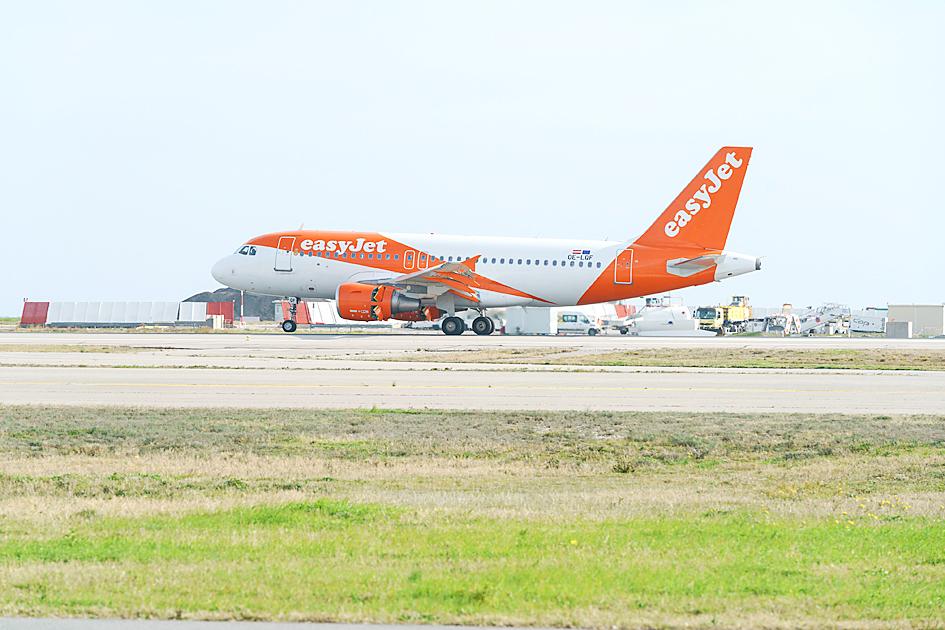EasyJet PLC said flight bookings jumped more than 300 percent and holiday bookings surged by more than 600 percent week on week, after the UK laid out plans for international travel to restart, hinting that borders could reopen from the middle of May.
The UK-based airline said trips from the UK to beach destinations — such as Malaga, Alicante and Palma in Spain; Faro, Portugal; and Crete, Greece — were the most popular destinations with holidaymakers keenest to travel in August.
July and September were the next most popular months.

Photo: Bloomberg
Shares of carriers like EasyJet, Ryanair Holdings PLC and British Airways owner IAG SA that have a large UK presence advanced on Monday after the plan to gradually reopen the economy was announced.
“We have consistently seen that there is pent-up demand for travel,” EasyJet chief executive officer Johan Lundgren said in a statement. “This surge in bookings shows that this signal from the government that it plans to reopen travel has been what UK consumers have been waiting for.”
The bookings came despite uncertainty over exactly how and when international routes can reopen.
Holidaymakers would know more on April 12 when the British government publishes a travel review. It has said that a lockdown ban on most international travel would stay until at least May 17.
The UK’s vaccine plan is progressing rapidly and more than 17.7 million people, or one-quarter of the population, have already had a first dose of the jab.
That gives hope to airlines and travel companies desperate to start earning revenues after COVID-19 pandemic restrictions that the UK would roll back holiday bans and quarantine restrictions and allow travel from the middle of May.
Foreign governments also need to agree that British holidaymakers can visit without the need for quarantine. France and Spain, for instance, have shut their borders to Britons due to new variants of the novel coronavirus.
Additional reporting by Bloomberg

The US dollar was trading at NT$29.7 at 10am today on the Taipei Foreign Exchange, as the New Taiwan dollar gained NT$1.364 from the previous close last week. The NT dollar continued to rise today, after surging 3.07 percent on Friday. After opening at NT$30.91, the NT dollar gained more than NT$1 in just 15 minutes, briefly passing the NT$30 mark. Before the US Department of the Treasury's semi-annual currency report came out, expectations that the NT dollar would keep rising were already building. The NT dollar on Friday closed at NT$31.064, up by NT$0.953 — a 3.07 percent single-day gain. Today,

‘SHORT TERM’: The local currency would likely remain strong in the near term, driven by anticipated US trade pressure, capital inflows and expectations of a US Fed rate cut The US dollar is expected to fall below NT$30 in the near term, as traders anticipate increased pressure from Washington for Taiwan to allow the New Taiwan dollar to appreciate, Cathay United Bank (國泰世華銀行) chief economist Lin Chi-chao (林啟超) said. Following a sharp drop in the greenback against the NT dollar on Friday, Lin told the Central News Agency that the local currency is likely to remain strong in the short term, driven in part by market psychology surrounding anticipated US policy pressure. On Friday, the US dollar fell NT$0.953, or 3.07 percent, closing at NT$31.064 — its lowest level since Jan.

Hong Kong authorities ramped up sales of the local dollar as the greenback’s slide threatened the foreign-exchange peg. The Hong Kong Monetary Authority (HKMA) sold a record HK$60.5 billion (US$7.8 billion) of the city’s currency, according to an alert sent on its Bloomberg page yesterday in Asia, after it tested the upper end of its trading band. That added to the HK$56.1 billion of sales versus the greenback since Friday. The rapid intervention signals efforts from the city’s authorities to limit the local currency’s moves within its HK$7.75 to HK$7.85 per US dollar trading band. Heavy sales of the local dollar by

The Financial Supervisory Commission (FSC) yesterday met with some of the nation’s largest insurance companies as a skyrocketing New Taiwan dollar piles pressure on their hundreds of billions of dollars in US bond investments. The commission has asked some life insurance firms, among the biggest Asian holders of US debt, to discuss how the rapidly strengthening NT dollar has impacted their operations, people familiar with the matter said. The meeting took place as the NT dollar jumped as much as 5 percent yesterday, its biggest intraday gain in more than three decades. The local currency surged as exporters rushed to